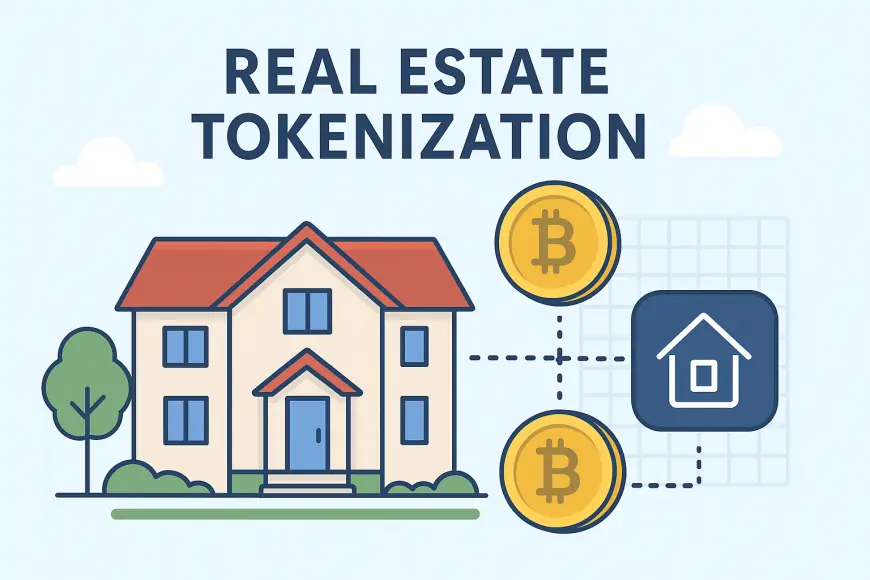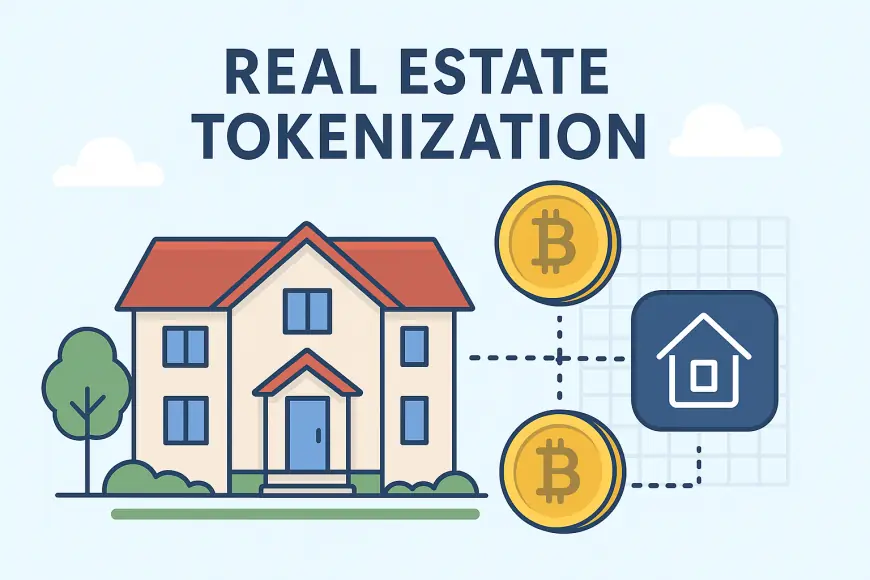Top 10 Benefits of Tokenizing Real Estate with Blockchain in 2025


The global real estate industry is undergoing a massive transformation as blockchain technology continues to revolutionize how assets are owned, traded, and managed. Real estate has traditionally been one of the most illiquid and capital-intensive markets, often requiring substantial investment and involving a long, complex process of documentation and approvals. However, with the rise of real estate tokenization in 2025, the barriers to entry are being broken down, and investors now have access to opportunities that were once reserved for the ultra-wealthy or institutional players.
Tokenization refers to the process of representing ownership of a physical or digital asset like a property, building, or land through blockchain-based digital tokens. These tokens can be fractionalized, making it possible for multiple investors to hold ownership shares of a single asset. Unlike traditional investment models, tokenization leverages blockchain’s transparency, security, and efficiency to create a new era of real estate investment.
In this blog, we will explore the top 10 benefits of tokenizing real estate with blockchain in 2025, explaining why this trend is shaping the future of property investment worldwide.
1. Fractional Ownership and Accessibility
One of the most revolutionary benefits of tokenizing real estate is the introduction of fractional ownership. Traditionally, real estate investment required significant capital outlay, making it challenging for small investors to participate. However, tokenization allows properties to be divided into blockchain-based tokens, each representing a fraction of ownership.
This means that instead of purchasing an entire property worth millions of dollars, investors in 2025 can buy a small percentage through tokens. For example, a luxury apartment valued at $10 million can be tokenized into 1 million tokens, each worth $10. This approach not only lowers the financial barrier to entry but also enables a diverse pool of global investors to participate in high-value real estate markets.
Fractional ownership democratizes access, bringing in new investors who previously couldn’t afford to enter the market. As a result, tokenized real estate fosters inclusivity, creating a broader and more dynamic investment landscape.
2. Enhanced Liquidity
Real estate has long been criticized for its illiquid nature. Unlike stocks or bonds, properties cannot be easily sold or exchanged. Transactions typically take months, involve multiple intermediaries, and incur high costs. Blockchain-based tokenization addresses this problem by introducing liquidity to real estate assets.
With tokenized real estate, investors can easily trade tokens on secondary markets, similar to how shares of a company are traded on stock exchanges. This opens up opportunities for investors to liquidate their positions quickly, reducing the traditional holding period associated with property investments.
In 2025, tokenized platforms are enabling real-time trading of real estate tokens, which boosts confidence among investors who prefer flexibility. Liquidity not only enhances the appeal of property investments but also attracts a broader range of market participants, from retail investors to institutional funds.
3. Global Investment Opportunities
Before tokenization, investing in international real estate markets was often restricted by regulatory hurdles, currency conversions, and logistical complexities. Tokenization has broken down these barriers by enabling borderless investments through blockchain.
A tokenized property in London can be purchased by an investor sitting in India or the United States within minutes. Blockchain ensures that the transaction is secure, transparent, and compliant with regulatory standards. This global accessibility creates a seamless investment environment, expanding opportunities for both investors and developers.
In 2025, tokenization is making real estate truly global by connecting markets that were previously isolated. Investors can now diversify their portfolios across continents without dealing with geographical restrictions, while property owners can access a global pool of potential buyers.
4. Transparency and Trust through Blockchain
Transparency is a cornerstone of blockchain technology. Every transaction is recorded on a decentralized ledger that cannot be altered, ensuring accountability and trust. In real estate, where fraud and mismanagement have often been concerns, tokenization provides a new level of transparency.
Ownership details, transaction history, and compliance records can all be verified on the blockchain. This reduces the risk of disputes, ensures clear ownership rights, and eliminates the need for excessive paperwork. Investors can easily track their holdings and confirm the authenticity of their ownership without relying on third-party verification.
By 2025, regulatory authorities are increasingly recognizing blockchain as a reliable tool for maintaining accurate property records. This not only instills confidence among investors but also builds trust in the overall system.
5. Reduced Transaction Costs
Traditional real estate transactions involve multiple intermediaries such as brokers, notaries, banks, and legal advisors, each charging a significant fee. These layers of intermediaries contribute to high transaction costs, making real estate investment expensive. Tokenization simplifies the process by using smart contracts on blockchain.
Smart contracts automate and enforce agreements without the need for middlemen. For instance, when an investor purchases real estate tokens, the transaction is executed automatically once pre-defined conditions are met. This reduces administrative overhead, eliminates unnecessary fees, and speeds up the process.
In 2025, many tokenized real estate platforms are operating with significantly lower transaction costs compared to traditional property deals. Lower costs not only benefit investors but also attract more participants into the market.
6. Faster Transactions and Settlements
Time is a critical factor in real estate investments. Conventional property transactions can take weeks or even months due to paperwork, approvals, and banking delays. With blockchain, tokenized real estate transactions are processed almost instantly.
Smart contracts facilitate faster settlements by automating tasks like identity verification, fund transfers, and ownership updates. This ensures that transactions are executed in real time without the need for manual intervention.
By 2025, tokenized platforms are allowing near-instant property transfers that once took months. This speed provides a major advantage for investors who want to quickly enter or exit the market, making real estate more attractive as an investment class.
7. Improved Security and Fraud Prevention
Security is a top concern in real estate, where fraud and document manipulation have historically plagued the industry. Blockchain’s decentralized and immutable nature makes it virtually impossible to tamper with records, ensuring secure ownership.
Tokenized assets are backed by blockchain, which provides cryptographic proof of ownership. This prevents unauthorized changes to property records and protects investors from scams. Additionally, blockchain-based systems often include multi-factor authentication and KYC/AML protocols to ensure compliance and safeguard users.
In 2025, blockchain has become one of the most trusted technologies for secure real estate transactions, giving investors peace of mind while protecting their assets against fraudulent activities.
8. Diversification of Investment Portfolios
Diversification is a key principle in investment strategy. Traditionally, real estate was difficult to include in diversified portfolios due to its high entry costs and illiquidity. Tokenization solves this by making real estate investments more affordable and liquid.
Investors in 2025 can allocate small portions of their capital to various tokenized properties across the globe. This allows them to spread risk across multiple markets, property types, and geographies. For example, one investor can hold tokens in a commercial property in Dubai, a residential unit in New York, and a hotel in Singapore simultaneously.
By enabling diversification, tokenization minimizes risk while maximizing potential returns, aligning real estate with other mainstream asset classes.
9. Greater Efficiency in Property Management
Tokenization also streamlines property management by integrating blockchain-powered platforms that automate rent collection, profit distribution, and compliance tracking. For instance, rental income from tokenized properties can be automatically distributed among token holders through smart contracts.
This automation eliminates delays, reduces errors, and ensures that investors receive timely returns. In addition, blockchain systems can provide real-time updates on property performance, making it easier for investors to make informed decisions.
In 2025, property managers are leveraging tokenization not only to attract investors but also to improve efficiency and transparency in day-to-day operations.
10. Opening New Avenues for Innovation
Tokenized real estate is not just about ownership it’s about innovation in financial products. With blockchain, developers and investors can explore new models like Real Estate Investment DAOs (Decentralized Autonomous Organizations), token-backed lending, and real estate derivatives.
For example, investors can use real estate tokens as collateral for loans, creating liquidity while maintaining ownership. Developers can raise funds for projects through token sales, providing an alternative to traditional financing. These innovative applications are redefining how capital flows in the real estate industry.
By 2025, tokenization is fueling the creation of a more dynamic and innovative ecosystem where traditional real estate and blockchain-based finance converge.
Conclusion
Real estate tokenization powered by blockchain is one of the most transformative trends of 2025. From fractional ownership and liquidity to transparency, security, and global accessibility, tokenization is reshaping the way people invest in and manage real estate. It eliminates traditional barriers, reduces costs, and introduces groundbreaking financial models that were once unimaginable.
As more investors, property developers, and regulators embrace this technology, the real estate industry is set to become more inclusive, efficient, and globally connected. Tokenization not only empowers individuals with new opportunities but also unlocks the full potential of blockchain in reshaping one of the world’s largest asset classes. The future of real estate investment is tokenized, and 2025 marks the beginning of this revolutionary journey.
What's Your Reaction?
 Like
0
Like
0
 Dislike
0
Dislike
0
 Love
0
Love
0
 Funny
0
Funny
0
 Angry
0
Angry
0
 Sad
0
Sad
0
 Wow
0
Wow
0



























































